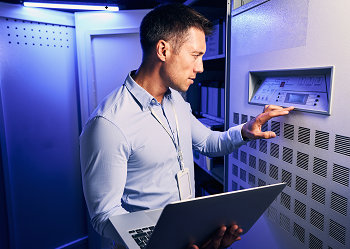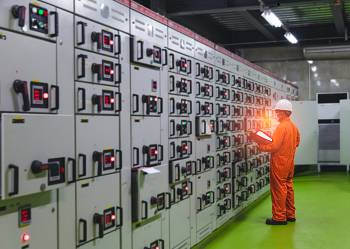
Organizations must implement a strong cyber security plan to protect their assets and operations from today’s sophisticated hackers. Cybercriminals have also become bolder by continuing to attack industrial infrastructure, manufacturers, and private citizens and extorting money from them. Contact ITI Technical College today to learn more about industrial control systems cybersecurity.
What can we do about these cyber threats? The answer lies in understanding the major threats to industrial control systems cybersecurity, its key components, adopting best cybersecurity practices, and employee training.
Industrial Control System (ICS)
An industrial control system (ICS) is a set of control systems and instrumentation to control industrial processes. These systems are crucial to the smooth operation of industries including manufacturing, power generation, petroleum, water management, chemical, and many more. An ICS is made up of hardware and software systems to monitor and control industrial devices, equipment, machinery, and processes.
An ICS includes manual operations to fully automated systems with different degrees of control and complexity. They can be basic and simple, such as a single machine, or complex like the operations of an entire manufacturing facility. The ICS combines multiple technologies to ensure efficient, continuous, and productive operations.
Major Threats To Industrial Control Systems Cybersecurity
Today’s threats to industrial control systems (ICS) cybersecurity pose potentially devastating harm to data, equipment, and operations. Attackers can gain access with lateral movement from an IT network and direct access to Internet-facing systems. They also use phishing attacks and exploit vulnerable IoT and Internet-connected systems. These major threats must be addressed with proper precautions:
- Advanced Persistent Threats – These threats are initiated by sophisticated hackers who gain persistent access to ICS networks to extract sensitive data or disrupt operations.
- Insider Threats – Some employees with privileged access to ICS systems commit malicious actions against their companies.
- Legacy Systems – Unfortunately, some ICS systems were built without security in mind and lacked encryption and authentication protection.
- Ransomware Attacks – The problems with ransomware attacks include encrypting ICS data, demanding payment to regain access, and potentially shutting down production.
- Zero-Day Exploits – Hackers discover new vulnerabilities in the company’s ICS software with no known patch.
Key Components Of Industrial Control Systems Cybersecurity
 Cybersecurity specialists in industrial facilities have discovered the key components of ICS cybersecurity they must control. Industrial control systems and infrastructure losses are at stake and must be protected. The key components of ICS security should include:
Cybersecurity specialists in industrial facilities have discovered the key components of ICS cybersecurity they must control. Industrial control systems and infrastructure losses are at stake and must be protected. The key components of ICS security should include:
- Access Control – Strong authentication methods must be employed to prevent data loss. Multi-factor authentications and restricting access to only authorized employees with the least privilege needed to perform their work must be implemented.
- Data Integrity – Employees must use secure protocols and monitor for data manipulation to ensure the accuracy and reliability of data transmitted in all their communications.
- Monitoring and Detection – Companies must use advanced monitoring tools and methods to detect potential threats and anomalies in real-time.
- Network Segmentation – Information technology employees divide the ICS network into separate isolated zones to limit potential attacks. This approach also protects the critical control systems from unauthorized access within the company’s network.
- Physical Security – Physical ICS devices must be protected from unauthorized use by employing security cameras, access controls, and environmental monitoring.
- Vulnerability Management – IT workers must regularly scan for vulnerabilities in industrial control system software and devices by applying patches to mitigate risks.
|
“It’s critical that organizations implement a strong cyber security plan to protect their assets and operations from today’s sophisticated hackers.” |
Best Practices For Industrial Control Systems Cybersecurity
 Organizations most successful at protecting their infrastructure from cyber attacks have adopted robust measures. They adopt cybersecurity awareness training by educating employees involved with ICS operations on potential threats and cybersecurity best practices. IT workers regularly back up critical ICS data for quick recovery in case of attacks.
Organizations most successful at protecting their infrastructure from cyber attacks have adopted robust measures. They adopt cybersecurity awareness training by educating employees involved with ICS operations on potential threats and cybersecurity best practices. IT workers regularly back up critical ICS data for quick recovery in case of attacks.
Conducting regular security audits is a strong approach that identifies vulnerabilities and potential risks within the ICS. Remote access to ICS systems must be secured by employing encryption and strong authentication. Whitelisting and blacklisting must be stopped by filtering network traffic to only allow authorized applications and block suspicious and malicious activity.
Regulatory compliance is another way to protect a company’s infrastructure. The Cybersecurity and Infrastructure Security Agency (CISA) provides guidelines and standards for ICS security in the U.S. Securing industrial control systems is crucial for maintaining operations and protecting infrastructure and data from cybercriminals.
What It Takes To Work In Instrument And Control Systems Technology
Earning an Instrument & Control Systems Technology (AOS) Associate In Occupational Studies Degree is a great way to land an entry-level job in this career. ITI Technical College has an excellent training program and faculty to help you become successful Contact us soon.
For more information about graduation rates, the median debt of students who completed the program, and other important information, please visit our website: https://iticollege.edu/disclosures/




